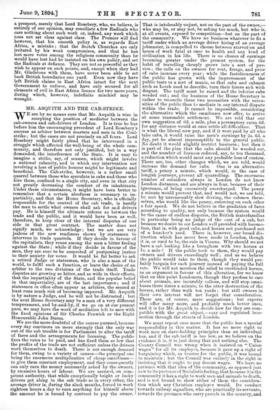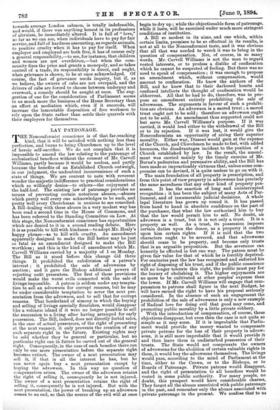MR. ASQUITH AND THE CAB-STRIKE.
WE are by no means sure that Mr. Asquith is wise in accepting the position of mediator between the cab-owners and cab-drivers of London. It is true he has before him the encouraging precedent of Lord Rosebery's success as arbiter between masters and men in the Coal- strike ; but the cases are not precisely on all fcurs. Lord Rosebery might fairly plead that he intervened in a struggle which affected the well-being of the whole com- munity, and therefore not only justified, but in a way demanded, the interference of the State. It is easy to imagine a strike, say, of seamen, which might involve a national calamity, and in which any intervention not involving a loss of public honour might be legitimate and beneficial. The Cab-strike, however, is a rather small quarrel between those who speculate in cabs and those who hire them, confined to a single city, and even in that city not greatly decreasing the comfort of its inhabitants. Under these circumstances, it might have been better to remember that a certain aloofness is necessary to im- partiality, and that the Home Secretary, who is officially responsible for the control of the cab trade, is hardly the man to settle what owners shall ask for and drivers pay. He is himself the ultimate referee as between the trade and the public, and it would have been as well, therefore, to keep clear of the internal disputes of one side in that great contract. The matter does not signify much, we acknowledge; but we are are very jealous of the new readiness shown by statesmen to intervene in trade quarrels. If they decide in favour of the capitalists, they rouse among the men a bitter feeling against the State ; while if they decide in favour of the men, they are sure to be suspected of postponing justice to their anxiety for votes. It would be far better to ask a retired Judge or statesman, who is also a man of the world, to fulfil such a function, or leave the choice of an arbiter to the two divisions of the trade itself. Trade disputes are growing so bitter, and so wide in their effects, that the impartiality of the State, and the popular belief in that impartiality, are of the last importance ; and if statesmen in office often appear as arbiters, the second at least runs much risk of becoming impaired. Mr. Asquith is by nature a Judge, and he will not be distrusted ; but the next Home Secretary may be a man of a very different temperament, and by-and-by, if we go on at our present pace, we may have the work of mediation left to men with the fixed opinions of Sir Charles Fenwick or the Right Honourable John Burns.
We are the more doubtful of the course pursued, because every day convinces us more strongly that the only way out of the cab trouble is for Parliament to alter the tariff of fares and the arrangements for licensing. The public fixes the rates to be paid, and has fixed them so low that the profits of the trade are not sufficient unless the drivers work themselves to death. There is not enough demand for them, owing to a variety of causes—the principal one being the enormous multiplication of cheap omnibuses— to give them constant employment, and they consequently can only earn the money necessarily asked by the owners, by excessive hours of labour. We are assured, on com- petent authority, that while exceptionally bright or lucky drivers get along in the cab trade as in every other, the average driver is, during the slack months, forced to work eighteen hours a day to earn anything for himself above the amount he is bound by contract to pay the owner. That is intolerably unjust, not on the part of the owner,— who may be, or may not, be asking too much, but who is, at all events, exposed to competition—but on the part of the community. We have no business whatever to fix a tariff under which an average driver hiring of an average jobmaster, is compelled to choose between starvation and hours of work fatal at once to health and any kind of civilisation in his life. There is no chance of earnings becoming greater under the present system, for the habit of travelling cheaply grows into a sort of pas- sion; the calls on the owners for rent, forage, and price of cabs increase every year ; while the fastidiousness of the public has grown with the improvement of the public taste to a sort of mania, so that cabs and cabmen such as Leech used to describe, turn their hirers sick with disgust. The tariff must be raised and the inferior cabs weeded out ; and the business of the Home Secretary is rather to reconcile these two necessities with the neces- sities of the public than to mediate in any internal dispute within the trade. It cannot be impossible, considering the alternative which the omnibuses now offer, to arrive at some reasonable settlement. We are told that our own suggestion of 6d. a mile, plus a peremptory extra 6d. for any distance would at once settle all difficulties. That is what the liberal now pay, and if it were paid by all who take cabs, it would raise the men's earnings by 2s. 6d. a day, yet be almost imperceptible to the general public. No doubt it would slightly restrict business ; but then it is part of the plan that the cabs should be weeded out, and the number of licences reduced, say, to ten thousand, a reduction which would meet any probable loss of custom. There are, too, other changes which, we are told, would increase the demand for cabs. One is an alternative tariff, a penny a minute, which would, in the case of longish journeys, prevent all quarrelling. The enormous number of outsiders always in London do not know London distances, and are always in fear, because of their ignorance, of being excessively overcharged. The penny a minute would prevent that, and would not, we are told, be met by unreasonably slow driving, the cabmen them- selves, who would like the penny, enforcing on each other a fair speed. We do not believe in the gradation of fares according to quality, not only because the system would be the cause of endless disputes, the British materfamilias in particular being no judge of the cost of a cab, but because we desire to see London well provided with locomo- tion, that is, with good cabs, and horses not purchased out of a knacker's yard. There is, however, one broad dis- tinction which has never been made in London, though it is, or used to be, the rule in Vienna. Why should we not have a cab looking like a brougham with two horses at is. a mile ? If the public took to them, they would pay owners and drivers exceedingly well ; and as we believe the public would take to them, though they would pro- bably bargain for each journey instead of paying the full rate. We will not mention the relief to overloaded horses, as an argument in favour of this alteration, for we know that on this point Londoners, though they profess to care about animals, are incurably callous, and will stop omni- buses three times a minute, to the utter destruction of the horses, rather than walk ten yards ; but still owners in their own interest will not forget that consideration. These are, of course, mere suggestions ; but experts will offer many more, and probably much better ones, and it is for Mr. Asquith to decide how far they are com- patible with the great object,—easy and regulated loco- motion through the streets of London.
We must repeat once more that the public has aspecial responsibility in this matter. It has no more right to work men on slave-holding principles than an individual has, and if the cab tariff is too low, as we believe on the evidence it is, it is just doing that and nothing else. The County Council was wrong when it insisted on "Union wages" for all its employs, because it gave up a right of bargaining which, as trustee for the public, it was bound to maintain ; but the Council was entirely in the right in insisting that it ought to pay decent wages. We have no patience with that idea of the community, so opposed just now to its pretence of Socialistic feeling, that because it is the community it has a right to work men and animals to death, and is not bound to show either of them the considera- tion which any Christian employer would. Its conduct towards railway signallers, who are practically its servants, towards the postmen who carry parcels in the country, and towards average London cabmen, is totally indefensible, and would, if there was anything honest in its professions of altruism, be immediately altered. It is full of "love," so far as we can see, when individuals have to pay for fair service, and full of hardness amounting, as regards animals, to positive cruelty when it has to pay for itself. When employer and employed are both free, it has of course only a general responsibility,—to see, for instance, that children and women are not overdriven,—but when the com- munit7 fixes the price and grants a monopoly, and so takes control of a trade, its responsibility is direct, and. ought, when grievance is shown, to be at once acknowledged. Of course, the fact of grievance needs inquiry, but if, as we believe, the owners of cabs are not overpaid, and the drivers of cabs are forced to choose between underpay and overwork, a remedy should be sought at once. The sug- gestion of one for the consideration of Parliament seems to us much more the business of the Home Secretary than an effort at mediation which, even if it succeeds, will increase the lamentable disposition of free workmen to rely upon the State rather than settle their quarrels with their employers for themselves.







































 Previous page
Previous page